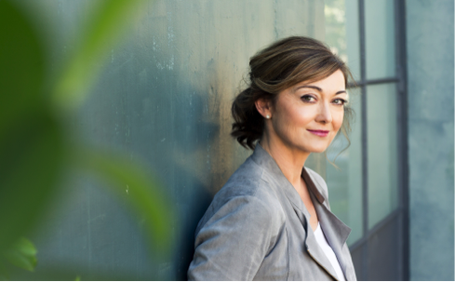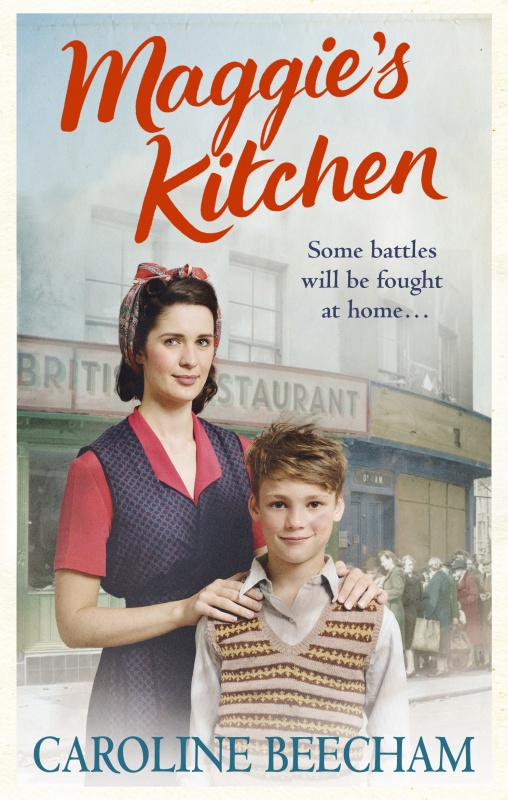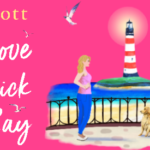Novel Kicks Chats to …Caroline Beecham
 Maggie’s Kitchen is the latest novel from Caroline Beecham (which is due to be released by Ebury Press on 27th July 2017) and I am happy to be welcoming her to Novel Kicks today.
Maggie’s Kitchen is the latest novel from Caroline Beecham (which is due to be released by Ebury Press on 27th July 2017) and I am happy to be welcoming her to Novel Kicks today.
When the British Ministry of Food urgently calls for the opening of restaurants to feed tired and hungry Londoners during WWII, aspiring cook Maggie Johnson seems close to realising a long-held dream. After overcoming a tangle of red tape, Maggie’s Kitchen finally opens its doors to the public and Maggie finds that she has an unexpected problem – her restaurant is too popular, and there’s not enough food to go round.
Then Maggie takes twelve-year-old street urchin Robbie under her wing and, through him, is introduced to a dashing Polish refugee, digging for victory on London’s allotments. Between them they will have to break the rules in order to put food on the table, and, perhaps, find love into the bargain…
Thank you for joining me today, Caroline. Can you tell me a little about your book, Maggie’s Kitchen and what inspired it?
‘Maggie’s Kitchen’ is a novel that follows the fortunes of Maggie Johnson as she sets up and runs a British Restaurant in London during the Second World War. The story focuses on the relationships that she develops with the community and in particular with Robbie, a twelve-year-old runaway, and Janek, a Polish refugee. Together they struggle through government red-tape to open the restaurant and then battle food shortages and community crisis to keep their doors open.
The novel is inspired by real events and I was intrigued by the fact these restaurants were created to help with the food shortages during the war. It seemed timely to write a story about them given the renewed interest in ‘paddock-to-plate’ and ‘nose-to-tail’ eating and our obsession with food.
The novel includes excerpts from the original Ministry of Food’s War Cookery Leaflets together with recipes that have been updated to suit contemporary tastes. The story is ultimately about hope and finding courage in the most unlikely of places.
What are the challenges of writing historical fiction?
Being inspired to write fiction based on real events and/or people and their achievements feels like a real privilege but there is also the danger of becoming too obsessed with your research and wanting to include everything in your book.
The key is to recognise how much detail to use to create the setting and as signposts to make the era authentic, but also remember you are creating a fictional work that needs to be real for your characters.
I’ve learnt that the first step is to recognise when to stop researching and start writing. The next is to know when to leave the research behind and just write freely, knowing that you can go back and check facts and details later; the most important thing is story and character.
That said, I was surprised at how strict the editors were in their fact checking with places, street names, and bus routes from the time for instance, but I suppose that’s good news for readers!
What is the best and hardest thing about being a writer?
The best thing about writing is being able to immerse yourself in fascinating subjects and people and different and interesting worlds; and your imagination of course. Initially I had wanted to write non-fiction because of my background working in television as well as to carry on storytelling in a different way after stopping fulltime work when I had children, but then I found myself drawn to fiction because it seemed to offer up more opportunities.
That’s what happened with ‘Maggie’s Kitchen’; I could have developed a documentary about these British Restaurants that few people had heard about but the characters of Maggie, Janek and Robbie emerged quite quickly, and the rest they say is history!
The hardest thing about being a writer is having the space and time to write. Everyone is very busy these days and juggling a family with other work commitments can be challenging.
When people asked what I did before I was published, I used to apologetically explain that I was writing a novel and they either rolled their eyes or were genuinely interested, but I didn’t feel as if I could legitimately say that was my work, even though I was totally committed to it and quite disciplined about spending time writing because I knew the novel wouldn’t write itself and that was what I had to do.
Now I realise that I need space around writing, not just the physical sitting down at the desk or doing research space but real headspace and that’s not always easy to get. I understand now why there are so many writers’ retreats and I think I need to apply for one!

Ebury Press, July 2017
Do you have any advice for writer’s block?
I have found that this is more often a physical problem than a mental one, and that if I go for a walk and make sure I have had enough physical exercise before I sit down, then it will often really help. I’m not sure of the physiological reasons except that you get increased blood flow, but going for a walk can be one of the most creative and productive times—and when you’re lying in bed at night trying to get to sleep!! The other kind of writer’s block is when I just have too much else going on and I think its best just to have a process where I get things done so I don’t feel overwhelmed: writing a list and crossing them off and not trying to write until I have cleared the decks a bit.
This can be personal or work stuff, or work around writing that needs attending to, but if I still can’t get into the swing of it, then reading at random or trying some writing exercises helps.
What’s your writing day like?
I try to write as much as I can in the morning but inevitably something else takes over, but on a good day I will do some exercise and then write from 10am through until 4pm when my children come home from school.
I’m always stopping for cups of tea and snacks, or to put another load of washing on, but I know when I’m in a good flow because I really resent having to leave my desk! I also used to like going shopping but now I see it as eating into my writing time so I’m trying to shop more online—I don’t know if that’s a good thing or not…
Do you plan before writing?
Yes, I am a big planner, which I think is down to my background and the fact that I usually start with a premise and then develop characters so my writing is essentially more plot-driven.
Edit as you go?
I try edit as I go as it helps focus where I am up to in the story and get back into character. I don’t know if this means there is less rewriting later because there are always new ideas forming and reshaping the story so its continually evolving. I know some writers just plough through and do a first draft and then go back and rewrite so I guess it’s just about finding what works best for you.
What elements do you believe make a good novel?
I get excited by an original storyline with a unique or surprising setting, that also gives new insights about human nature. The characters are the key element though—as they say, character is story and story is character—and unless they are appealing characters that you care about, there really is no reason to invest in their journey.
The other element that turns a good novel into a great novel, is when it’s really compelling. When I had a first draft of ‘Maggie’s Kitchen’, I believed in it but I subsequently read two books that I found so compelling and I knew that I could make it better; ‘The Light Between Oceans’ and ‘The Miniaturist’ were books that I couldn’t put them down and I knew that I had to look at my characters and story to see how to improve them and make it compelling too.
Which three fictional characters would you like to have round for dinner?
I hate to be predictable but at this point in time I would have to choose Robbie, Janek and Maggie as I am missing them and would like to spend more time with them—and besides, Maggie can do the cooking!
What’s your favourite word and why?
I love the word ‘serendipity’, for how it sounds as well as what it means.
What advice do you have for someone who is wanting to write a novel but doesn’t know where to begin?
Firstly, write about what you know or care about or what you are interested in, preferably both. If you have a specialist field of knowledge or background then great; my family had restaurants that I worked in growing up so I knew what a great microcosm they could be but also how close the community could become, which was invaluable for writing ’Maggie’s Kitchen.’
The next step would be to do a reputable writing course because it not only gives you the structure and discipline to write, but also the access to experienced writers and authors who know the craft. Lastly, it really is valuable to keep a journal and be observant, notice things around you: people, mannerisms, how people talk etc.; it helps spark ideas and when it comes to writing character when you need to write through the senses, these cues are invaluable.
 More about Caroline:
More about Caroline:
Caroline is a British-born Australian-based author, writer and producer, and is currently working on her second novel. This new novel is about a war artist and is also set during the Second World War.
With 20 years experience across a range of genres including documentary, drama and entertainment she has worked as a writer, producer and director in Europe, the US and Australasia. As well as developing many of her own ideas for programming and adapting a best-selling book for the small screen, she has written the novelization of the film Rainbow.
Caroline has held the roles of Head of Development at Winchester Pictures and Brighter Pictures (part of Endemol Group) in the UK and was Head of Television Development for Becker Entertainment Group, one of Australia’s leading production houses and distributors. In addition to involvement in specific productions, she assessed television projects, managed creative development, and established relationships with co-production partners and broadcasters.
For more information about Caroline, visit https://carolinebeecham.wordpress.com
Caroline is also on Twitter: https://twitter.com/@CarolineBeecham
 My verdict on Maggie’s Kitchen:
My verdict on Maggie’s Kitchen:
Set in London during World War II, Maggie currently works in the canteen in a radio factory. Not entirely happy and working for a mean boss, as well as being an aspiring cook, she seizes the opportunity and opens a restaurant to feed tired and hungry Londoners. In doing this, she finds she is closer to realising her dream of owning her own restaurant.
However she soon discovers that the restaurant is too popular and she doesn’t have enough of the strictly rationed ingredients to go around.
With the help of Robbie (a young boy she found roaming on his own,) and a Polish man named Janek, she finds she has to break a few rules to feed everyone who comes to her restaurant.
From the beginning you know how strong a character Maggie is (even if she doesn’t always believe it in herself.)
Living in London in one of the hardest times, Maggie is doing everything she can to help the people around her despite the personal heartbreak she is currently going through.
Robbie and Janek are also interesting characters and there are some mysteries surrounding them. Erica and Rose are also great and compliment Maggie well.
Caroline sets the scene so skillfully. The descriptions of WWII London are very vivid and well written, I felt as though I was walking alongside Maggie.
It is plotted and paced excellently (and made me very hungry whilst reading, haha.)
A great fictional account set in an historical period, I found this book very enjoyable and found it hard to put down.
If you like historical fiction, food or just a great story, I throughly recommend Maggie’s Kitchen. I look forward to reading more from Caroline Beecham.





Leave a Reply